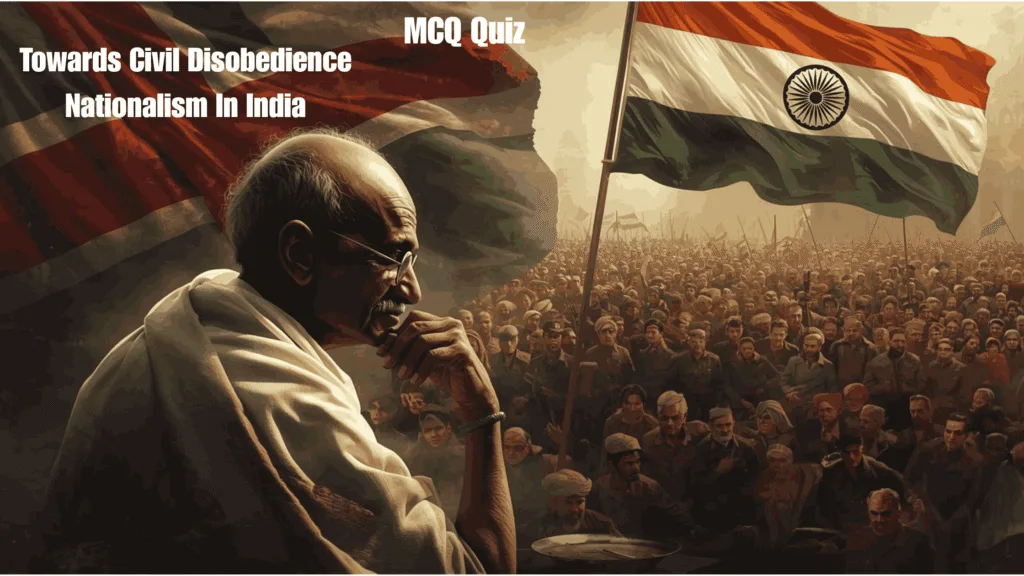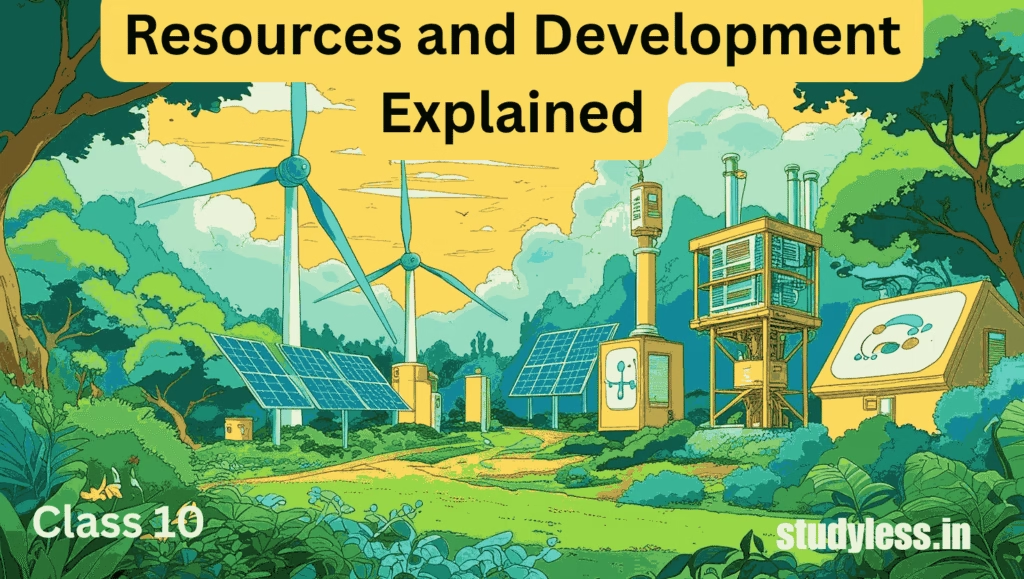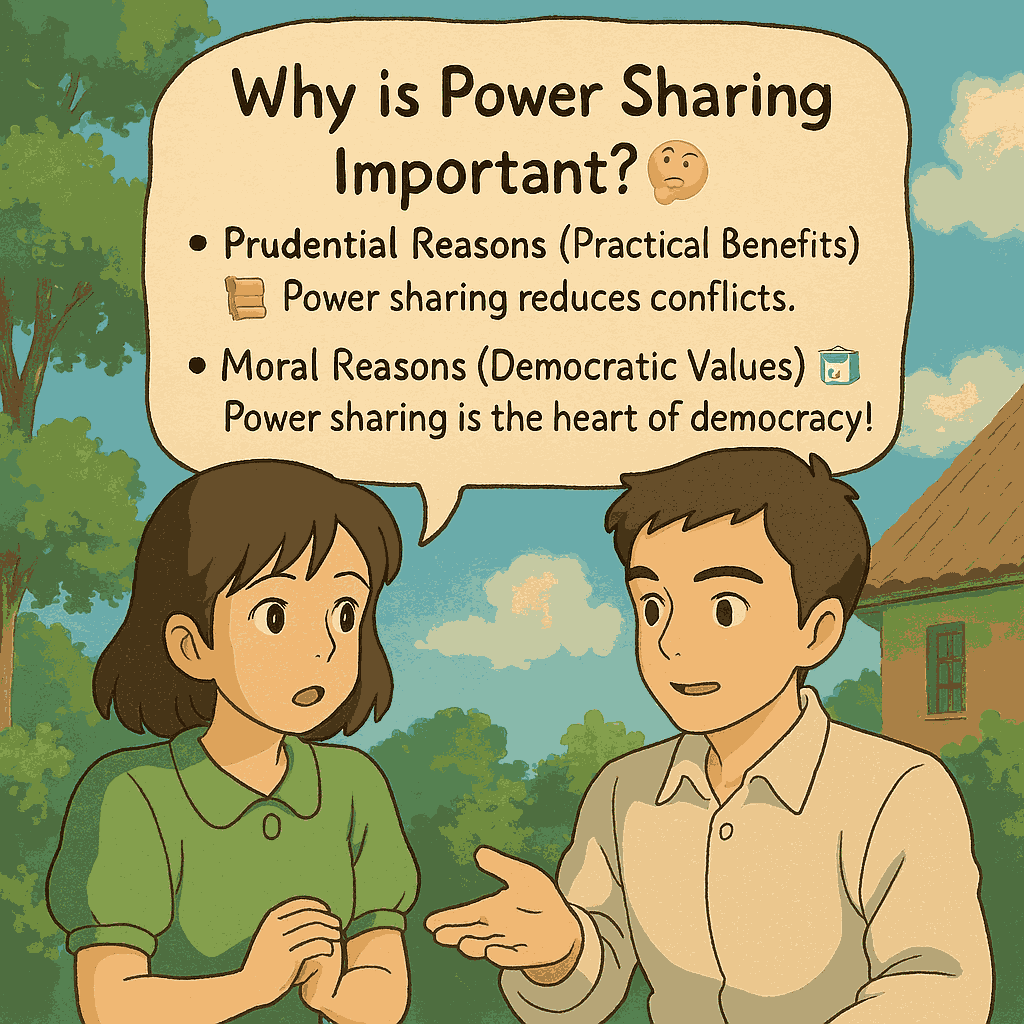
Why do some nations crumble while others unite?
Discover the Secret:
✅ Belgium’s Success: Thrives with community governments and equal power splits.
❌ Sri Lanka’s Civil War: Collapsed under majoritarianism and exclusion.
📚 What You’ll Learn:
- 4 Forms of Power Sharing: Horizontal, Vertical, Social Groups, Political Parties.
- India’s Federal Model: Balances 22+ languages and diverse cultures.
- Real-World Impact: How power sharing prevents chaos and fuels democracy.
Table of Contents
Part 1: Belgium’s Genius Move 🤝
Imagine this: You’re in a group project with friends. One person refuses to share tasks, takes all the credit, and chaos erupts. Belgium faced something similar but fixed it with power sharing!
What Happened?
- Diversity Drama:
- 59% speak Dutch (Flemish region), 40% French (Wallonia), 1% German.
- Brussels Chaos: 80% French speakers in the capital, but Dutch speakers are the majority nationwide. Think of it like your class monitor being chosen by kids from another school! 😤
- The Fight:
- French speakers (minority) were richer and more powerful.
- Dutch speakers felt ignored, leading to 1950s-60s tensions, especially in Brussels.
How Belgium Fixed It:
- Split Power: Created Central Govt. (for national issues) and Regional Govts. (Flanders & Wallonia).
- Brussels Fairness: Equal seats for Dutch and French in the capital.
- Community Govt.: A separate team to handle language/culture issues (like your school’s cultural committee!).
- Veto Power: No major decision without everyone’s agreement.
Result? Peace! No civil war, no partition. 🕊️
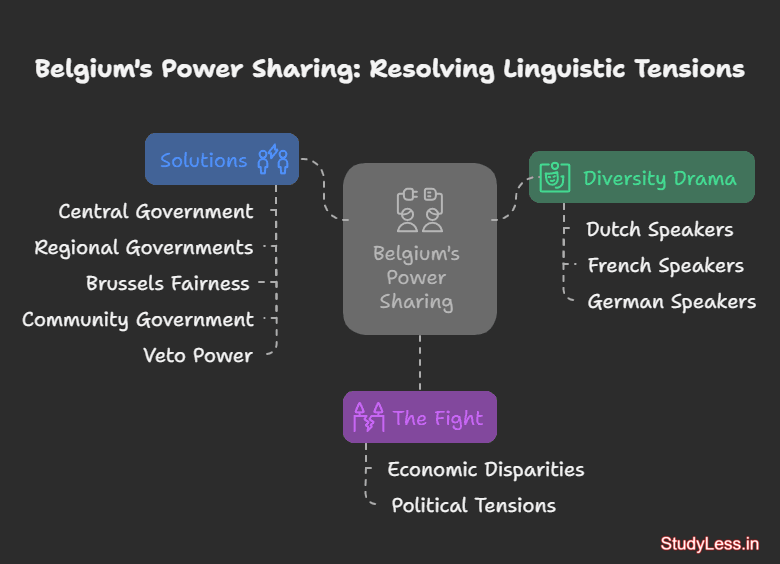
Part 2: Sri Lanka’s Costly Mistake 💥
Now, imagine: Your class votes to ban Tamil or Bengali and only use Hindi. That’s what Sri Lanka did!
What Went Wrong?
- Ethnic Mix:
- Sinhala (74%): Majority, Buddhist.
- Tamils (18%): Split into Sri Lankan Tamils (native) and Indian Tamils (planters’ descendants).
- Majoritarian Bullying:
- 1956 Sinhala Only Act: Made Sinhala the sole official language. Tamils were sidelined in jobs and education.
- No Power Sharing: Majority imposed its will. Imagine your class ignoring your ideas because you’re outnumbered!
Consequences:
- Tamil protests → 26-year Civil War (1983–2009).
- 1 lakh+ deaths, families torn apart. ☠️
Lesson: No power sharing = Explosive conflict!
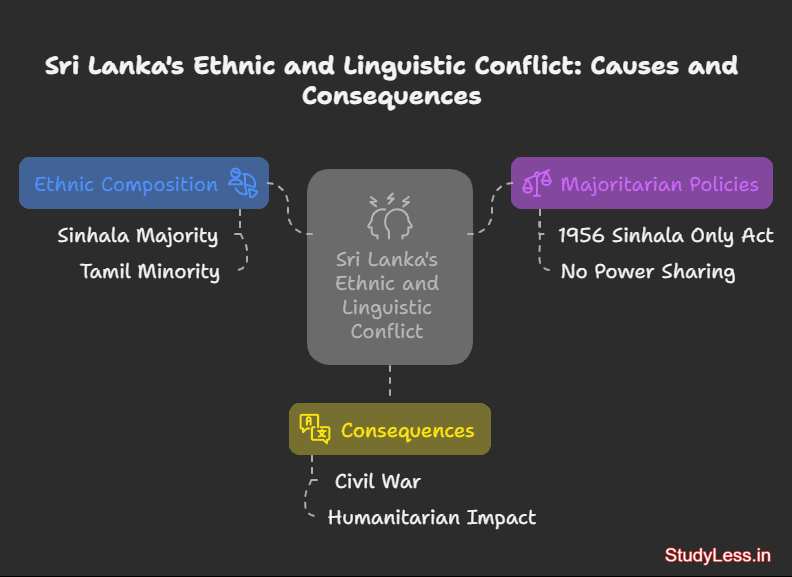
Belgium vs. Sri Lanka: Quick Recap!
| Aspect | Belgium (Smart! 🧠) | Sri Lanka (Oops! 😬) |
|---|---|---|
| Approach | Shared power with minorities | Let majority dominate |
| Language | Equal status for Dutch/French | Sinhala Only Act |
| Result | Peace & unity ✌️ | Civil War ☠️ |
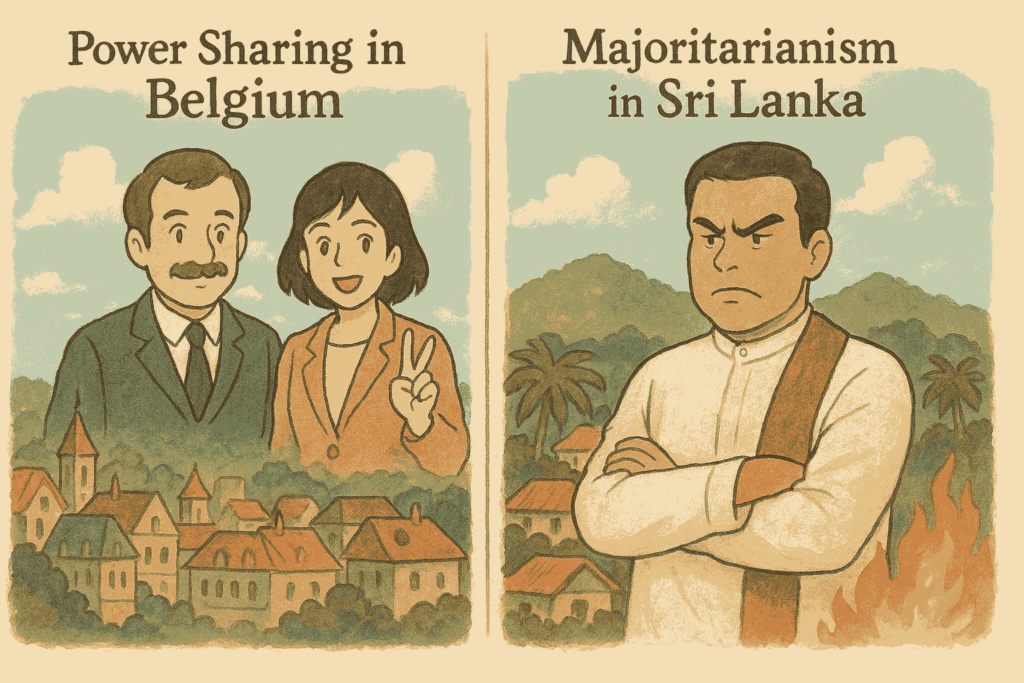
Let’s Test Your Understanding!
Q1. Why did Brussels become a tension hotspot?
a) Too many waffle shops 🧇
b) Dutch majority nationally vs. French majority in the capital ✅
c) German speakers wanted more chocolate
Q2. What triggered Sri Lanka’s civil war?
a) Sinhala Only Act ✅
b) Too many coconut trees 🥥
c) Tamils wanted pizza
Exam Hacks! 🚀
- Mnemonics to Save Time:
- Belgium: B.R.A.V.E → Brussels equality, Regional govts., All agree (veto), Voices heard (Community Govt.), End result: Peace!
- Sri Lanka: S.T.O.P → Sinhala Only Act, Tamil anger, Ongoing war, Power sharing rejected.
- Key Terms:
- Power Sharing = Dividing power to avoid conflict.
- Majoritarianism = Majority bullies minorities.
Think Like a Leader! 👑
Scenario: Your class has 60% Hindi speakers, 30% Tamil, 10% Bengali. How would you ensure everyone’s voice is heard?
- Belgium’s Tip: Create “language groups” for event planning!
- Sri Lanka’s Warning: Ignoring minorities = chaos!
P.S. India uses power sharing too! Think Linguistic States (Tamil Nadu for Tamils) and Reservation System.
Got it? Power sharing isn’t just politics—it’s life skills! Share this with friends and debate: “Would YOU share power?” 🗣️✨
Accommodation in Belgium 🤝
Hey! Let’s dive into how Belgium became the rockstar of peace 🌟 by sharing power smartly—while Sri Lanka’s story ended in tears. Grab a snack, and let’s break it down!
Why Belgium Needed Power Sharing
Picture this: You’re in a class with 59% Hindi speakers, 40% Tamil, and 1% Bengali. Now, imagine the Hindi group starts making all the rules, ignoring others. Chaos, right? 😤 That’s what Belgium faced:
- Dutch (59%): Majority nationwide.
- French (40%): Minority but richer and historically powerful.
- Brussels Mess: 80% French speakers in the capital, but Dutch majority outside. Imagine your school council being run by another school!
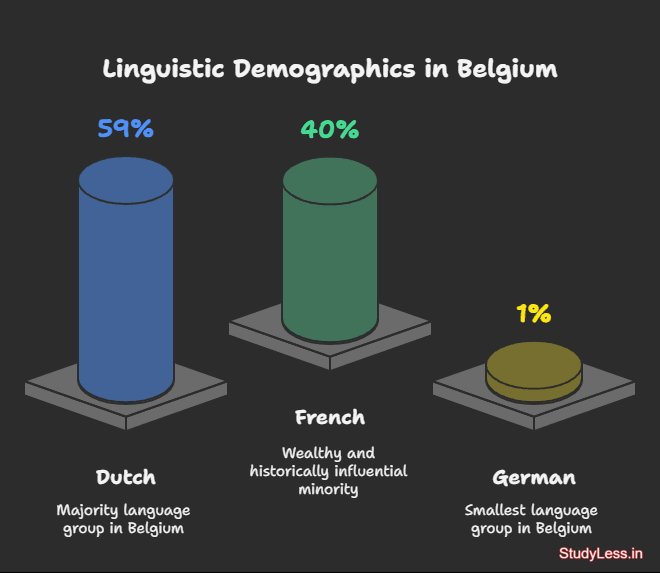
Belgium’s Genius Power-Sharing Hacks 🧠
1. Federal Government: Split the Work!
- Central Govt.: Handles national stuff (defense, currency).
- Regional Govts.: Flanders (Dutch) and Wallonia (French) manage local issues.
Like splitting a group project: You handle the PPT, your friend writes the report!
2. Brussels: 50-50 Rule
- Equal seats for Dutch and French in the capital.
Even if 80% of your class wants pizza 🍕, you compromise and order 50% pizza, 50% samosas!
3. Community Government: Culture Boss
- A separate govt. for language, education, and culture.
Like a school “Cultural Committee” organizing Diwali and Christmas celebrations!
4. Veto Power: Everyone’s Voice Matters
- No major decision unless all communities agree.
Imagine needing a “yes” from your entire squad before planning a trip!
Result? No civil war, no partition—just peace! 🕊️
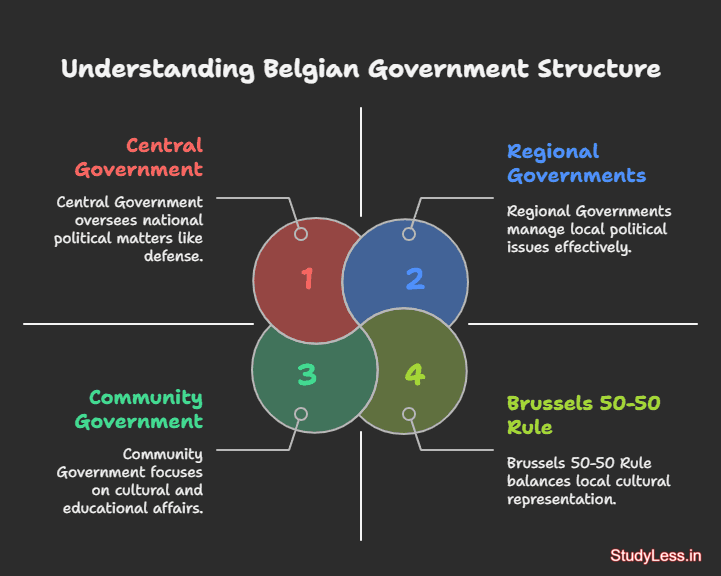
Why This Matters
- Power Sharing = Smart Survival: Kept Belgium united despite diversity.
- Sri Lanka’s Opposite Move: Majoritarianism → 26-year war. Lesson learned!
Test Your Knowledge! 📚
MCQs
Q1. What ensured equal Dutch-French representation in Brussels?
a) Veto power
b) 50-50 seat rule ✅
c) Community government
Q2. What does Belgium’s Community Government handle?
a) Defense
b) Language and culture ✅
c) Tax collection
Assertion-Reason (A/R)
Assertion (A): Belgium’s power-sharing model prevented a civil war.
Reason (R): It gave veto power to all communities.
Options:
a) Both A & R are true, and R explains A ✅
b) Both A & R are false
Why? Veto power forced consensus—no group could bulldoze decisions!
One-Sentence Summaries
- Belgium: Divided power, saved unity!
- Sri Lanka: Majority rule = 26-year war.
Exam Hacks! 🚀
- Mnemonics:
- B.R.A.V.E for Belgium’s model:
- Brussels equality
- Regional autonomy
- All agree (veto)
- Voices heard (Community Govt.)
- End result: Peace!
- B.R.A.V.E for Belgium’s model:
- Key Terms:
- Federalism = Split power (Central + Regional).
- Veto Power = Everyone’s “yes” needed.
- Pro Tip: Compare Belgium & Sri Lanka in essays—teachers love contrasts!
Think Like a Leader! 👑
Scenario: Your school has 60% North Indians, 30% South Indians, 10% East Indians. How would YOU share power?
- Belgium’s Idea: Create committees for each region to plan festivals!
- Sri Lanka’s Warning: Letting one group dominate = protests!
Fun Fact: India’s Linguistic States (like Karnataka for Kannada) were inspired by Belgium’s model!
Got it? Power sharing isn’t just politics—it’s about fairness in your classroom, squad, and life! ✨
Accommodation in Belgium – The Art of Power Sharing 🌟
Hey Class! Let’s crack Belgium’s secret recipe to peace in a country split between Dutch and French speakers. No wars, no splits—just smart power sharing! 🧠🤝
Why Belgium Needed Power Sharing
Imagine your school has two groups: 60% Hindi speakers and 40% Tamil speakers. If one group makes all the rules, the other feels ignored. That’s what Belgium faced!
- Dutch (59%): Majority nationwide but minority in the capital Brussels.
- French (40%): Minority but historically richer and powerful.
- Brussels Chaos: 80% French speakers in the capital, surrounded by Dutch-majority areas. Like your class monitor being chosen by another class! 😤
Belgium’s 4 Genius Power-Sharing Hacks 🛠️
1. Equal Ministers in Central Govt.
- Rule: Dutch and French ministers are equal in number.
- Veto Power: For key decisions, both groups must agree.
Like needing both teams’ approval to change the rules of a cricket match! 🏏
2. Strong State Governments
- Powers Split: Central Govt. handles national issues (defense, currency), while State Govts. (Flanders & Wallonia) manage local stuff.
Like your school principal handling exams, and class monitors managing projects! 📚
3. Brussels’ 50-50 Rule
- Equal Seats: Dutch and French have equal seats in Brussels’ government.
Even if 80% of your class wants pizza 🍕, you compromise: 50% pizza, 50% samosas!
4. Community Govt. for Culture
- Elected by Language Groups: Handles education, festivals, and language rights.
Like a “Cultural Committee” organizing both Diwali and Christmas in school! 🪔🎄
Why Did This Work?
- No One’s Left Out: Everyone’s voice matters → No civil war!
- Sri Lanka’s Lesson: Majoritarianism (ignoring minorities) led to a 26-year war. Belgium chose wisdom over ego!
Test Your Brain! 🧠
MCQs
Q1. What ensures Dutch and French ministers have equal power?
a) Community Govt.
b) Equal seats in Central Govt. ✅
c) Veto power
Q2. Who manages cultural issues in Belgium?
a) State Govt.
b) Community Govt. ✅
c) Central Govt.
Assertion-Reason (A/R)
Assertion (A): Belgium’s model prevented division of the country.
Reason (R): It gave veto power to both linguistic groups.
- Answer: Both A and R are true, and R explains A ✅
Why? Veto power = No group can bulldoze decisions. Teamwork makes the dream work!
Exam Hacks! 🚀
- Mnemonics: B.E.S.T for Belgium’s Model:
- Brussels 50-50
- Equal ministers
- State autonomy
- Third govt. (Community)
- Key Terms:
- Power Sharing = Including all groups in decision-making.
- Veto Power = “No” button to unfair decisions.
- Essay Tip: Contrast Belgium (success) with Sri Lanka (failure). Use phrases like “power sharing prevents conflict”.
Real-Life Connection 🌍
- India’s Linguistic States: Like Belgium, India created states based on language (e.g., Tamil Nadu).
- Your School: How would you share power between Hindi and Tamil speakers in a project?
Remember: Power sharing isn’t just for governments—it’s for classrooms, friend groups, and families too! ✨
Share this with a friend and ask: “Would YOU give veto power to someone you disagree with?” 💬
Let’s connect the dots between Belgium’s peace and Sri Lanka’s war to answer: Why should countries share power? Spoiler: It’s not just “nice”—it’s survival!
Key Lessons from Belgium & Sri Lanka
- Belgium’s Wisdom:
- Power Sharing = Unity: Respecting all communities (Dutch, French, German) kept the country united.
- Example: Equal ministers, veto power, and community govt. made everyone feel valued.
- Sri Lanka’s Mistake:
- Majoritarianism = Disaster: Forcing Sinhala dominance led to civil war.
- Example: Sinhala Only Act → Tamil anger → 26-year conflict.
Takeaway: Power sharing isn’t just “fair”—it’s smart!
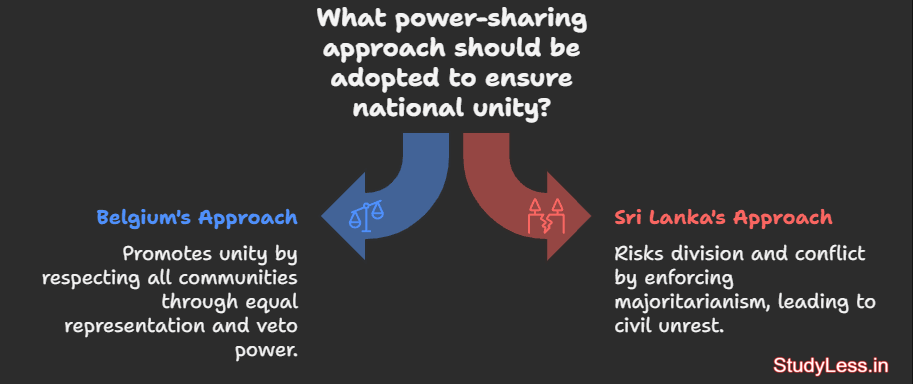
Why Power Sharing is Desirable?
1. Moral Reason: It’s Fair!
- Democracy’s Core Value: People are the source of power. Sharing it respects their rights.
- Example: Belgium’s equal ministers → No group feels ignored.
2. Practical Reason: It Prevents Explosions! 💥
- Reduces Conflict: When all groups have a say, tensions cool down.
- Belgium: No civil war despite diversity.
- Sri Lanka: Majoritarianism → War.
- Stability: Inclusive decisions last longer.
3. Deepens Democracy:
- People Feel Heard: Trust in the system grows.
- Example: India’s coalition govts. force parties to share power.
4. Smart Management of Diversity:
- No “One Size Fits All”: Different communities need different solutions.
- Belgium: Community govt. for language issues.
- Sri Lanka: Ignored Tamil needs → Rebellion.
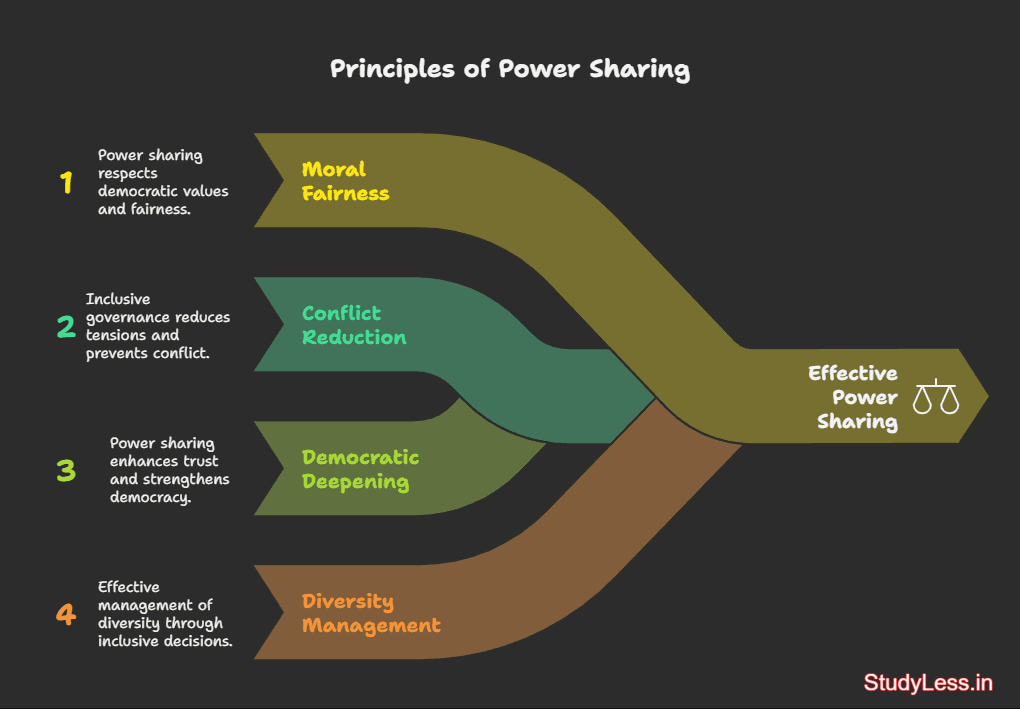
Test Your Understanding! 🧠
MCQs
Q1. What is the moral reason for power sharing?
a) It’s fun
b) It’s fair and democratic ✅
c) It saves money
Q2. How did power sharing help Belgium?
a) Caused a civil war
b) Prevented conflict and united the country ✅
c) Made everyone speak German
Assertion-Reason (A/R)
Assertion (A): Power sharing reduces the risk of conflict.
Reason (R): It gives all groups a stake in the system.
- Options:
a) Both A and R are true, and R explains A ✅
b) Both are false
Why? When people feel included (R), they’re less likely to rebel (A)!
One-Sentence Summary
- Power sharing is desirable because it’s fair, prevents conflict, and keeps nations united!
Exam Hacks! 🚀
- Mnemonics: P.R.A.I.S.E Power Sharing:
- Prevents conflict
- Respects diversity
- Avoids majoritarianism
- Inclusive democracy
- Stability
- Ensures fairness
- Key Terms:
- Majoritarianism = Majority tyranny.
- Moral Reason = Fairness.
- Practical Reason = Conflict prevention.
- Pro Tip: Use Belgium vs. Sri Lanka as examples in essays.
Real-Life Connection 🇮🇳
- India’s Power Sharing:
- Linguistic States (Tamil Nadu, Punjab).
- Reservation system for marginalized groups.
- Coalition governments.
- Imagine: If only Hindi speakers ruled India? Chaos!
Food for Thought: Next time your friend group plans a trip, try “power sharing”! Let everyone pick one activity. Does it reduce fights? 😉
Final Question: If you were PM, would you share power with opponents? Debate with a friend! 🗣️💬
Why Power Sharing is Desirable?
Because it is the Smart & Right Thing to Do! 🧠✨ How ? keep reading…..
Key Idea
Power sharing isn’t just nice—it’s necessary! Let’s break down why with two rock-solid reasons:
1. Prudential Reason: It’s Smart! 💡
(A.K.A: Avoid Chaos!)
- Problem: Majority rule can backfire. Imagine a school where only Class 10 students decide everything. Juniors revolt, fights erupt!
- Solution: Share power → Reduce conflict.
- Example: Belgium’s veto power stopped Dutch/French clashes.
- Anti-Example: Sri Lanka’s Sinhala Only Act → Civil War 💥.
- Outcome: Stability! Peaceful politics, happy citizens.
Metaphor Alert 🍕:
Power sharing is like splitting a pizza. If one person hogs all slices, others starve. Share slices (power), and everyone stays full (happy)!
2. Moral Reason: It’s Right! ❤️
(A.K.A: Democracy’s Heart!)
- Core Idea: People have a right to be heard.
- Example: Voting isn’t just a duty—it’s your voice!
- Why?
- Legitimacy: Governments earn trust by including everyone.
- Dignity: All communities deserve respect.
- Sri Lanka’s Mistake: Ignoring Tamils’ rights → Lost trust → War.
Real-Life Link 🏫:
Your school council isn’t just for monitors—it’s for everyone’s ideas. That’s democracy in action!
Prudential vs. Moral
| Prudential (Smart) | Moral (Right) |
|---|---|
| Prevents fights & instability 🛡️ | Respects people’s dignity ✊ |
| “Avoid disaster!” 💥 | “Do the right thing!” 🌟 |
| Example: Belgium’s veto power | Example: India’s reservation system |
Why Should YOU Care?
- Group Projects: If one person dominates, others lose interest. Share tasks → Better grades! 📚
- Social Media: Ever seen a group chat where admins mute everyone? That’s majoritarianism!
Next Up: Forms of Power-Sharing 🌐
Sneak Peek: Power isn’t just split between “Central” and “States”. It’s shared in 4 cool ways:
- Horizontal: Between legislature, executive, judiciary (like India’s 3 branches).
- Vertical: Central → State → Local governments (e.g., Panchayats).
- Community: For cultural/linguistic groups (Belgium’s genius hack!).
- Political: Coalition governments (parties share power).
Test Your Brain! 🧠
Q1. Which reason focuses on preventing conflict?
a) Prudential ✅
b) Moral
Q2. What’s the moral reason for power sharing?
a) It’s cheaper
b) It’s the spirit of democracy ✅
Exam Hacks! 🚀
- Mnemonics:
- P.M for Reasons: Prudential (Practical) & Moral.
- H.V.C.P for Forms: Horizontal, Vertical, Community, Political.
- Key Terms:
- Prudential = Practical benefits (stability).
- Moral = Ethical duty (fairness).
Food for Thought 🤔:
If you were class monitor, would you let juniors decide some rules? That’s power sharing!
Pro Tip: Use phrases like “power sharing prevents tyranny” or “democracy thrives on inclusion” to ace essays! ✍️
Next : We’ll dissect the 4 Forms of Power Sharing—get ready to see how India, Belgium, and YOU use them! 🛠️
Forms of Power Sharing
Subtitle: Dividing Power Like a Pizza! 🍕
Why Power Sharing? Quick Recap!
Imagine if one person controlled your school’s canteen menu, sports day, and exams. Chaos, right? Power sharing ensures no single group holds all power—keeping peace and fairness! 🌟
4 Forms of Power Sharing
1. Horizontal Power Sharing
(Dividing Power Equally)
- How? Split power among three branches:
- Legislature (Parliament): Makes laws.
- Executive (PM, Ministers): Enforces laws.
- Judiciary (Courts): Interprets laws.
- Example: India’s system! The Supreme Court can cancel laws made by Parliament if unconstitutional.
- Key Term: Checks & Balances → Each branch watches the others.
- Metaphor: Like a three-legged race 🏃♂️🏃♀️—no one can run ahead alone!
2. Vertical Power Sharing
(Dividing Power Levels)
- How? Central Govt. (top) → State Govt. → Local Govt. (Panchayats).
- India: Union Govt. (Defense, Currency) + State Govt. (Education, Health).
- Belgium: Regional govts. for Flanders (Dutch) & Wallonia (French).
- Key Term: Federalism → Power divided between tiers.
- Metaphor: Like school hierarchy! Principal → Teachers → Monitors.
3. Power Sharing Among Social Groups
(Fair Share for Minorities)
- How? Reserve seats for marginalized groups (SCs/STs/OBCs, women).
- India: Reserved constituencies in Parliament.
- Belgium: Community Govt. for Dutch, French, German speakers.
- Why? Prevents alienation.
- Example: Imagine your school reserving seats in the council for juniors!
4. Power Sharing Among Political Parties & Groups
(No Party Owns Power!)
- How?
- Coalition Govt.: Parties team up (like India’s NDA/UPA).
- Pressure Groups: Farmers, unions influencing policies.
- Example: AAP and Congress alliance in Delhi.
- Metaphor: Like a cricket team 🏏—different players (parties) share roles!
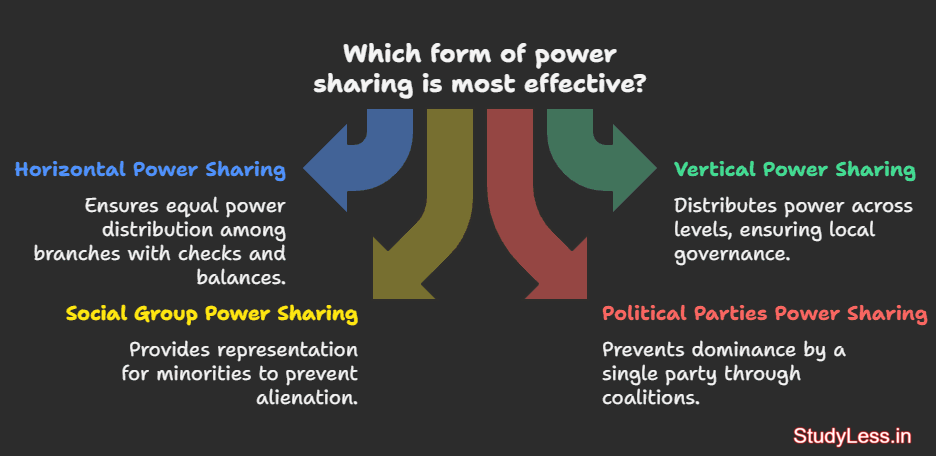
Interactive Zone! 🧠
MCQs
Q1. Which form of power sharing ensures “checks and balances”?
a) Horizontal ✅
b) Vertical
Q2. Reserved constituencies for SC/STs are an example of:
a) Vertical sharing
b) Social group sharing ✅
Assertion-Reason (A/R)
Assertion (A): Coalition governments prevent one-party dominance.
Reason (R): They force parties to share power and negotiate.
Options:
a) Both A & R are true, and R explains A ✅
b) Both are false
One-Sentence Summaries
- Horizontal: Three branches balance power.
- Vertical: Central → State → Local levels.
- Social Groups: Reservations include minorities.
- Parties: Coalitions prevent monopoly.
Exam Hacks! 🚀
- Mnemonics: H.V.S.P → Horizontal, Vertical, Social, Political parties.
- Key Terms:
- Checks & Balances (Horizontal).
- Federalism (Vertical).
- Reserved Constituencies (Social).
- Coalition Govt. (Political).
- Pro Tip: Use India vs. Belgium examples in essays!
Real-Life Connection 🇮🇳
- Panchayati Raj: Power shared with villages (Vertical).
- Women’s Reservation Bill: Proposed 33% seats for women (Social).
- Opposition Parties: Keep ruling party in check (Horizontal).
Fun Fact: Brussels, the capital of Belgium, is also the HQ of the European Union! Power sharing made it a global symbol of unity 🌍.
Final Question: If you were PM, would you share power with rivals? 🤔 Debate with friends!
Conclusion
Belgium’s peace vs. Sri Lanka’s war – the choice is clear.
Key Takeaways:
🔑 Power Shared = Power Multiplied: Inclusion prevents conflict.
🔑 Democracy’s Heartbeat: Fairness, dignity, and unity.
🔑 Your Role: From school councils to global politics, sharing power shapes tomorrow.
Final Question: Could your classroom thrive without teamwork?
FAQs Power Sharing
1. What is power sharing?
Power sharing is dividing authority among groups, regions, or institutions to prevent conflict and ensure inclusive governance. Example: Belgium’s community governments.
2. How did Belgium avoid civil war?
Belgium adopted 4 power-sharing methods: federalism, equal seats in Brussels, community governments, and veto power.
3. Why did Sri Lanka’s majoritarianism fail?
The Sinhala Only Act (1956) ignored Tamil rights, leading to a 26-year civil war.
4. What are the 4 forms of power sharing?
a)Horizontal (legislature, executive, judiciary)
b)Vertical (Central → State → Local governments)
c)Among social groups (reservations, community govt)
d)Among political parties (coalitions).
5. Why is power sharing desirable?
Prudential: Prevents conflict (e.g., Belgium’s peace).
Moral: Upholds democracy’s spirit (fairness, dignity).
6. What is horizontal power sharing?
Power split equally among legislature, executive, and judiciary. Example: India’s Supreme Court checking Parliament.
7. What is vertical power sharing?
Power divided into levels: Central → State → Local. Example: India’s Panchayati Raj.
8. How do social groups share power?
Via reservations (SCs/STs in India) or community governments (Belgium’s language groups).
9. What role do political parties play in power sharing?
Parties form coalitions (e.g., NDA/UPA) to share power, ensuring no single group dominates.
10. How does power sharing strengthen democracy?
Linguistic states (Tamil Nadu), reservations, and federalism.
You may also like Explained! Gender, Religion, and Caste Class 10 CBSE

